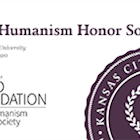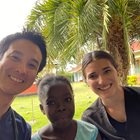During National Hispanic Heritage Month, KCU is honored to recognize the contributions and influence that Hispanic Americans have made to American society. Join us this week as KCU students share how their heritage has influenced their call to medicine and what it means to advocate for the Latinx community.
Vanessa Blanco
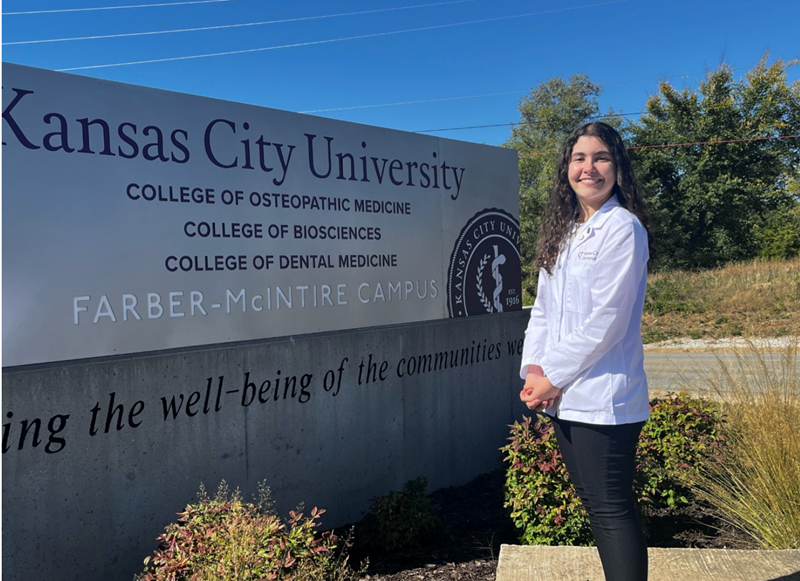
First year student doctor Vanessa Blanco says a trip to Haiti with her family when she was in middle school opened her eyes to the health care disparities affecting underserved populations. Years later she took a mission trip in her home state of Florida with Remote Area Medical. There, she served as a translator for English-speaking providers and Spanish-speaking patients visiting the mobile clinic. During translation, she learned that many patients had gone years without medical care. “That experience stuck with me. I realized it’s not just people abroad who have limited access to health care. We have many people in my own community without access to the care they need,” she said.
Vanessa has an immense sense of pride for the tenacity the people of Cuba demonstrate during times of great adversity. “When faced with hardship, Cubans don’t give up. They persevere using any and all available resources to get by. They have incredible strength,” she continued.
Though she has not determined which specialty she would like to pursue after graduation, Vanessa knows her heritage and a desire to care for the underserved will play key roles in her decision. She hopes to focus on a specialty that will allow her to build long-term relationships with patients while working toward a future with equalized access to care for all.
Grace Cooper
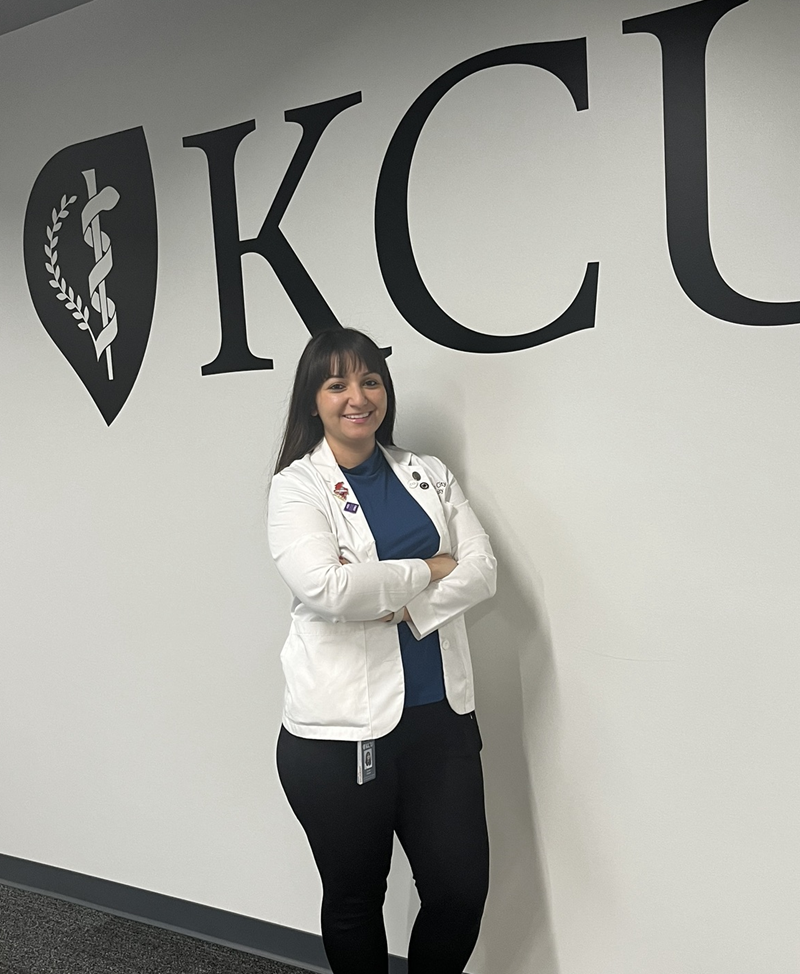
Second-year KCU student Grace Cooper knew at an early age that she wanted to become a doctor. Her journey to medical school, however, was not easy. She completed a bachelor’s in biology in 2017 and planned to go straight to medical school. When those plans didn’t come to fruition, Grace went to work in the pharmaceutical industry. In the meantime, she earned a master’s degree. “Earning my master’s really solidified for me that I could achieve anything I set my mind to. I was no longer held back by my own self-doubt and fear of failure,” she remarked.
Grace credits her family for helping her achieve her dream of pursuing a career in medicine. “Without their encouragement and unwavering support, I would not be who I am today,” she said.
Though Grace was born in the United States and raised in Atlanta, Georgia, she has always remained close to extended family in Colombia. She appreciates that she and her family make the effort to celebrate Colombian traditions.
As a future physician, Grace hopes to be a voice for the under-represented, especially in Latino communities. She has seen firsthand the language and cultural barriers they face. “From a very early age, I accompanied my mom anytime she needed health care services so I could be her interpreter. It was difficult because I was so young and I didn’t always understand what was going on—but I wanted so desperately to be a voice for her,” said Grace. “In my future practice, I want to be a bridge that fills that gap.”
Monica Aspra Rubi

Born in Honduras, second-year med student Monica Aspra Rubi, feels fortunate for her exposure to different cultures through her father’s work with the United Nations. Before moving to Canada when Monica was 12, she and her family lived between Kosovo and Honduras. A formative experience, that allowed her global health interests to flourish.
Prior to medical school Monica worked as a lab scientist. One of her patients had lost a significant amount of blood. He began to make improvements but took a turn for the worse and did not survive. Reflecting on the loss, Monica couldn’t help but wonder if there was more she could have done for him at the bedside. That moment became pivotal in her decision to pursue a career in medicine.
“I’m most proud that I get to share my heritage with others. Many times, people have pre-conceived ideas about what it means to be LatinX. There are so many different cultures and ethnicities within the Latino community. I appreciate the opportunities I have to educate others,” said Monica. “I want to be a person first and a physician second. I want to uphold the dignity of my future patients. I’m proud that my heritage and my upbringing have given me an exposure to diverse populations and helped me develop a deep sense of empathy.”
Rebecca Centeno
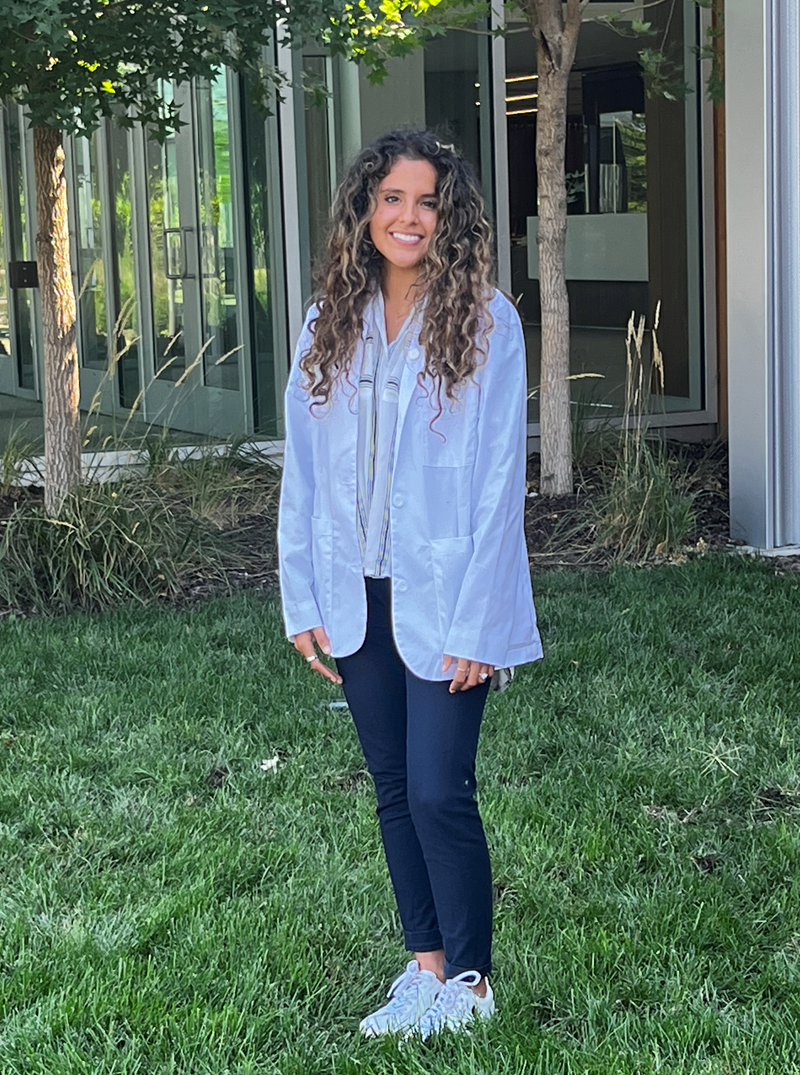
Growing up with four sisters in a single-parent home, Rebecca Centeno never imagined that she had what it takes to become a physician. Her mother worked long hours to make ends meet and provide a good life for her daughters, but that meant Rebecca did not always have the guidance she needed to navigate the road to college.
“We lived in Atlanta and went to school where most of the students were White. As a Latino, I sometimes felt ‘less than.’ I straightened my curly hair and wore makeup to lighten my skin as I tried to look like everyone else. I didn’t want anyone to know my ethnicity,” said Rebecca.
Her path to KCU was not easy, but thanks to the mentorship of a rheumatologist at the clinic where Rebecca worked, she developed the confidence she needed to pursue her dream. “The doctor I worked with was Puerto Rican and had a story similar to mine. Over time, with her encouragement, I began to see that I could achieve anything I set my mind to and that I was capable of becoming a physician—more than capable,” said Rebecca.
Today, the first-year med student speaks proudly of her heritage and appreciates the adversity she has overcome. She knows her experiences will serve her future patients well by allowing her to help them overcome their own obstacles.
-----------------------------------------------------------------------------------
Posted October 6th, 2020
During National Hispanic Heritage Month, KCU's Medical Spanish Club and Student Government Association collaborate to recognize the contributions and influence that Hispanic Americans have made to American society. KCU students share how their heritage has influenced their call to medicine and what it means to advocate for the Latinx community.
Sirai Ramirez
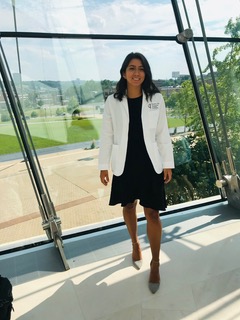 My parents were immigrants from Mexico and Peru. They raised me as a hard worker and taught me the meaning of grit and leading by example. Pursuing a medical career is difficult, however, as a young Hispanic woman, I had to confront difficult realities about my path toward medicine.
My parents were immigrants from Mexico and Peru. They raised me as a hard worker and taught me the meaning of grit and leading by example. Pursuing a medical career is difficult, however, as a young Hispanic woman, I had to confront difficult realities about my path toward medicine.
My family came from a poor background and did not understand the U.S. school system well. It took a higher level of initiative and ambition for me to aim for higher goals.
I was drawn to medicine to add to the force of future Hispanic physicians and to be a resource for minority populations. My parents worked so hard for me. I envision giving back to my community by providing the best health care I can and being compassionate and understanding of different situations.
Elisa Chaparro
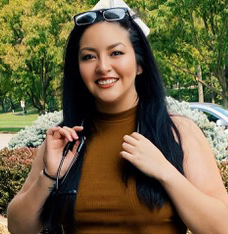 I was forced to leave my parents behind in Mexico at age 13. My family was impoverished and could not afford my education. My father did not have a formal education because of his socioeconomic status, so he emphasized taking advantage of opportunities.
I was forced to leave my parents behind in Mexico at age 13. My family was impoverished and could not afford my education. My father did not have a formal education because of his socioeconomic status, so he emphasized taking advantage of opportunities.
I chose medicine due to my family’s financial shortcomings. Health issues were brushed under the rug, not because they didn’t want to address their health concerns, but because they lacked resources to do so. Some relatives were denied at health facilities because they could not afford immediate treatment.
Growing up, I didn’t have a mentor to show me the ropes or someone who genuinely loved their occupation. I want my family to have that role model and for my parents to know I worked hard to make a career of something I love - caring for others.
Paula Benavides
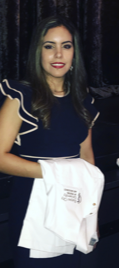 I think my heritage has created a big sense of urgency and responsibility to become a physician. My community needs more Spanish speaking providers who can understand their needs and develop trust. I feel the weight of this on my shoulders, which drives me to persevere academically regardless of how difficult this is.
I think my heritage has created a big sense of urgency and responsibility to become a physician. My community needs more Spanish speaking providers who can understand their needs and develop trust. I feel the weight of this on my shoulders, which drives me to persevere academically regardless of how difficult this is.
My favorite tradition is Las Novenas. Nine days before Christmas, we take turns hosting novenas. It is a gathering involving the community where we eat traditional food, sing Christmas songs and pray. It is nine consecutive days of spending time together and having fun.
I am obsessed with fried plantains! My favorite recipe is tostadas. You cut a green plantain in thirds and fry it, then you pull it out and smash it and fry it again! You top it with chicken or beef and different sauces, it is amazing!
Sabrina Demaestri
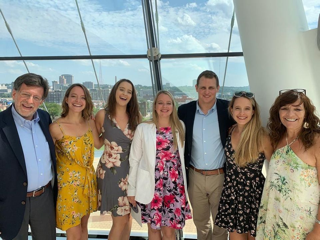 As daughters of Argentine immigrants, our parents emphasized the importance of bilingualism and strong connections to our roots to shape our identities, and to build the impact we could make on whatever communities where we live and work. As a future Latina physician, it is my top priority to serve a population of Spanish-speaking patients, who might otherwise face language barriers in accessing health care. I will always be grateful to my parents who made sure to give me every opportunity they could, and who insisted we speak Spanish at the dinner table — todo es posible, gracias a ustedes!
As daughters of Argentine immigrants, our parents emphasized the importance of bilingualism and strong connections to our roots to shape our identities, and to build the impact we could make on whatever communities where we live and work. As a future Latina physician, it is my top priority to serve a population of Spanish-speaking patients, who might otherwise face language barriers in accessing health care. I will always be grateful to my parents who made sure to give me every opportunity they could, and who insisted we speak Spanish at the dinner table — todo es posible, gracias a ustedes!
Brandon Bautista
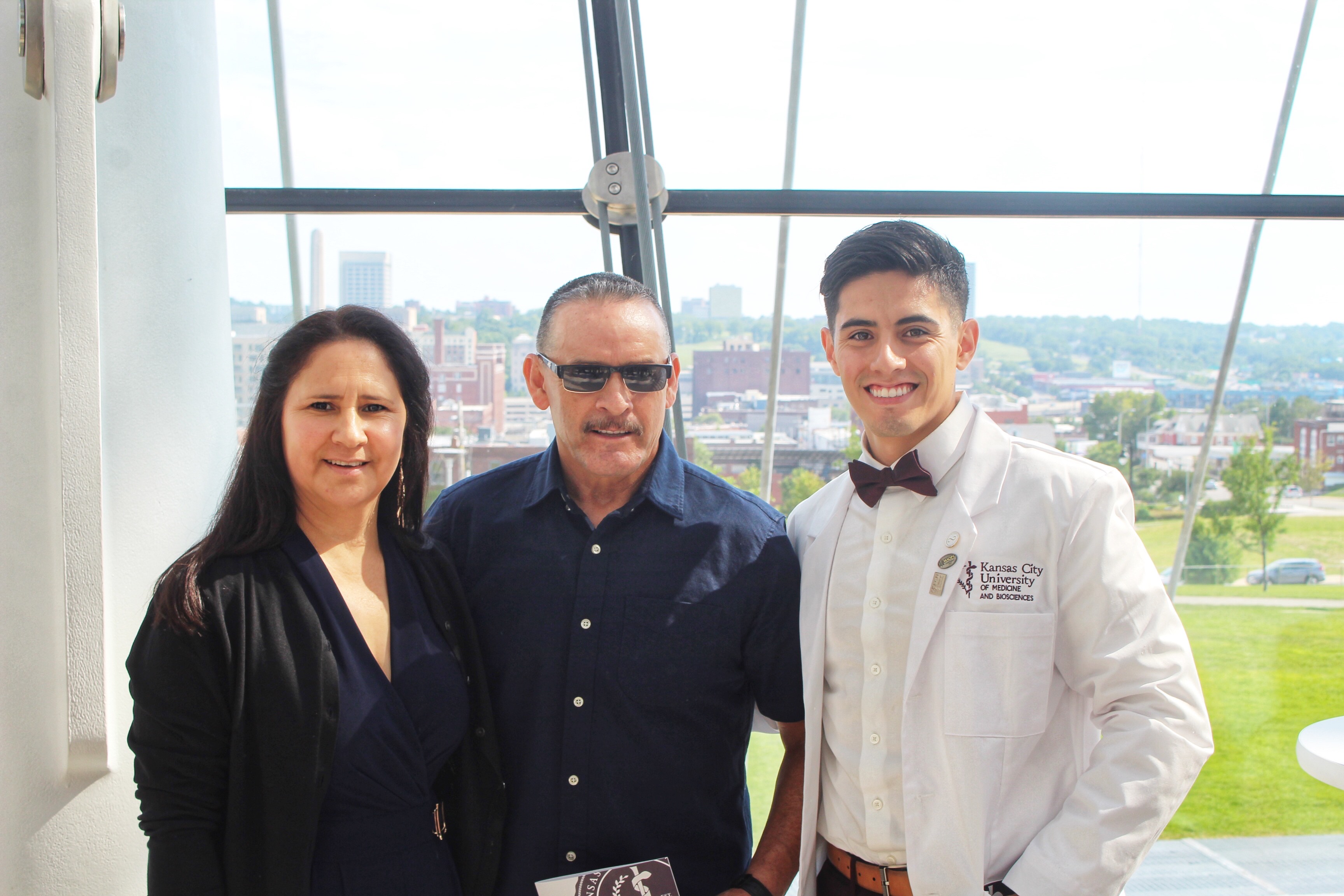 My parents both emigrated to the U.S. at a young age and worked hard to put food on the table. I remember as a kid when I would tag along with my dad as he went to the agricultural fields in California. I saw a sea of lettuce picked by immigrants from different Latin American countries. I recognized the fighter spirit of our ancestors. I work hard when I embark on a new task, and it’s something I learned because I was constantly surrounded by this work ethic.
My parents both emigrated to the U.S. at a young age and worked hard to put food on the table. I remember as a kid when I would tag along with my dad as he went to the agricultural fields in California. I saw a sea of lettuce picked by immigrants from different Latin American countries. I recognized the fighter spirit of our ancestors. I work hard when I embark on a new task, and it’s something I learned because I was constantly surrounded by this work ethic.
I remember going to doctors’ appointments with my parents and having to translate. I still remember the first time we had a doctor who spoke Spanish. It brought relief to my parents, and it made for a healthier encounter. One day I will be somebody’s first Mexican doctor, or somebody’s first Spanish speaking doctor. It’s a humble reminder that there is much more work to do. This is why I am passionate about being a medical student and I am extremely blessed to be at KCU.
My favorite Mexican tradition is something we simply call “carne asada.” It’s just family getting together and grilling thin strips of steak, along with rice, beans, guacamole, and all things delicious. There are always family gatherings with different main dishes, but when someone says that carne asada is the main dish, everybody’s ears perk up.
Melissa Parlade
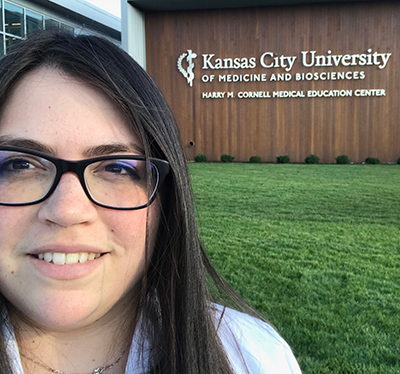 My family immigrated to the U.S. in the 1960s after making the decision to leave everything behind to escape the horrors of communism. I learned early on about how people in Cuba were abused and even killed for opposing the communist revolution.
My family immigrated to the U.S. in the 1960s after making the decision to leave everything behind to escape the horrors of communism. I learned early on about how people in Cuba were abused and even killed for opposing the communist revolution.
My parents’ and grandparents’ generations have laid the foundation for me and others like me, who have benefited greatly from their sacrifices and the freedoms afforded to us in the U.S.A. Cubans grow up with a feeling of gratitude for what we have in this country. This gratitude contributed to my pursuit of medicine.
My culture has influenced my career decisions. I want to give back to the community who accepted my family and gave us the opportunity to build the lives we have today. As physician shortages grow and the population grows older, I fear many, especially non-English speakers in my hometown, will fall by the wayside. This is why giving back to my community as a health care provider is important to me, and I am grateful for the opportunity to be able to help in this capacity.
Ulysses Fernandez-Miro
Raised as a first-generation Spanish-Cuban American, I have developed a profound appreciation for America's freedoms, thanks in part to my family's struggles with communism. As a result, I grew up wanting to serve my community, keeping the glory of my God and my country's freedom and welfare at the forefront. My Hispanic heritage has bolstered my ability to view people as the multifaceted individuals they are while seamlessly embracing the multiracial world we live in today. As a KCU medical student, I look forward to the opportunity to make a difference in America's health care system by promoting communication and encouraging the realization of our freedoms in the health care arena. Thanks to my diverse Caribbean and Mediterranean family, I am proud to contribute my nugget of diversity to the great nation I serve.
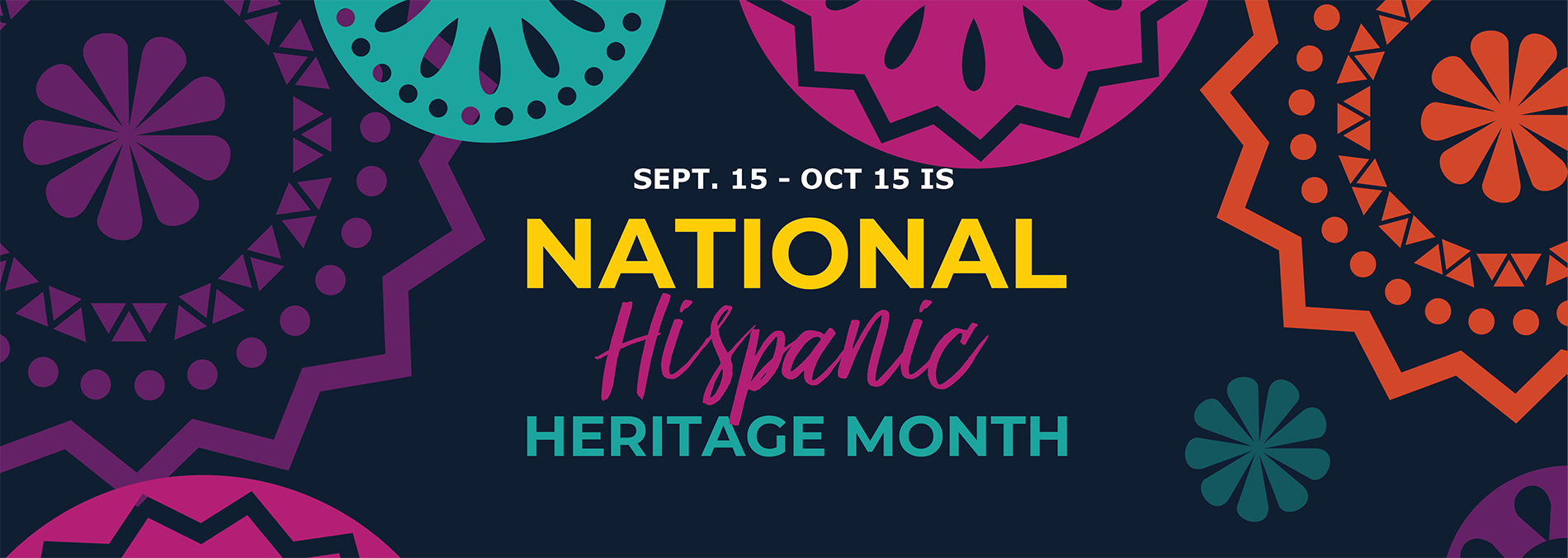
_20240119154035_0.png?w=140&h=140)
